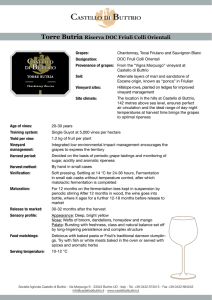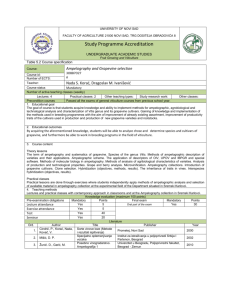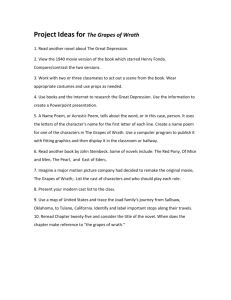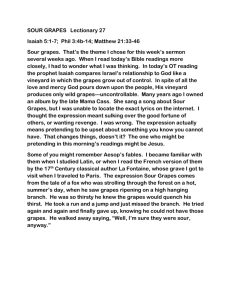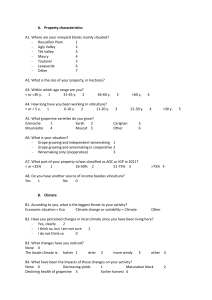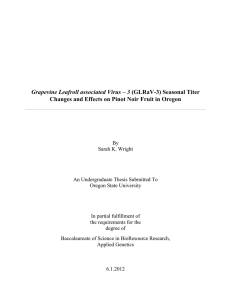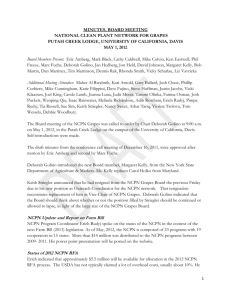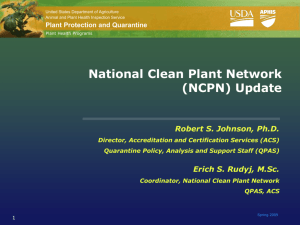NCPN Grapes Clean Plant Centers National Clean Plant Network
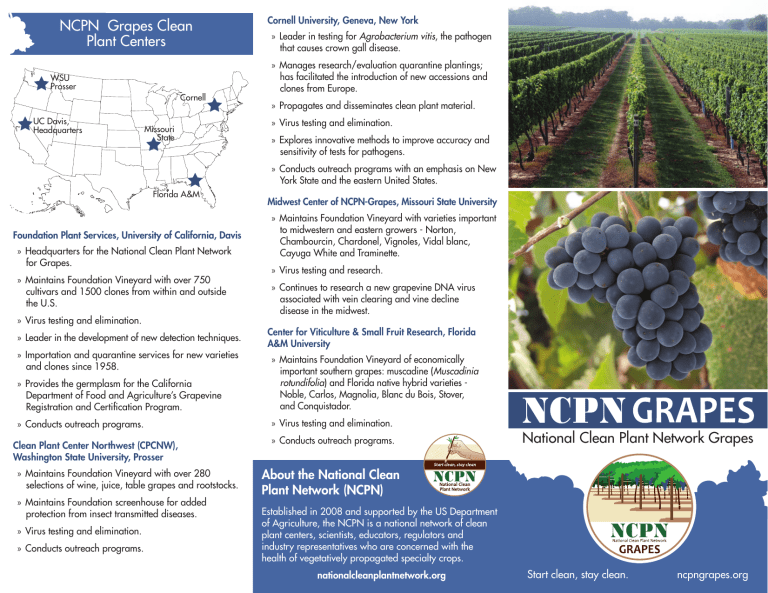
NCPN Grapes Clean
WSU
Prosser
UC Davis,
Headquarters
Plant Centers
Missouri
State
Cornell
Florida A&M
Foundation Plant Services, University of California, Davis
» Headquarters for the National Clean Plant Network for Grapes.
» Maintains Foundation Vineyard with over 750 cultivars and 1500 clones from within and outside the U.S.
» Virus testing and elimination.
» Leader in the development of new detection techniques.
» Importation and quarantine services for new varieties and clones since 1958.
» Provides the germplasm for the California
Department of Food and Agriculture’s Grapevine
Registration and Certification Program.
» Conducts outreach programs.
Clean Plant Center Northwest (CPCNW),
Washington State University, Prosser
» Maintains Foundation Vineyard with over 280 selections of wine, juice, table grapes and rootstocks.
» Maintains Foundation screenhouse for added protection from insect transmitted diseases.
» Virus testing and elimination.
» Conducts outreach programs.
Cornell University, Geneva, New York
» Leader in testing for Agrobacterium vitis, the pathogen that causes crown gall disease.
» Manages research/evaluation quarantine plantings; has facilitated the introduction of new accessions and clones from Europe.
» Propagates and disseminates clean plant material.
» Virus testing and elimination.
» Explores innovative methods to improve accuracy and sensitivity of tests for pathogens.
» Conducts outreach programs with an emphasis on New
York State and the eastern United States.
Midwest Center of NCPN-Grapes, Missouri State University
» Maintains Foundation Vineyard with varieties important to midwestern and eastern growers - Norton,
Chambourcin, Chardonel, Vignoles, Vidal blanc,
Cayuga White and Traminette.
» Virus testing and research.
» Continues to research a new grapevine DNA virus associated with vein clearing and vine decline disease in the midwest.
Center for Viticulture & Small Fruit Research, Florida
A&M University
» Maintains Foundation Vineyard of economically important southern grapes: muscadine ( Muscadinia rotundifolia) and Florida native hybrid varieties -
Noble, Carlos, Magnolia, Blanc du Bois, Stover, and Conquistador.
» Virus testing and elimination.
» Conducts outreach programs.
About the National Clean
Plant Network (NCPN)
Established in 2008 and supported by the US Department of Agriculture, the NCPN is a national network of clean plant centers, scientists, educators, regulators and industry representatives who are concerned with the health of vegetatively propagated specialty crops.
nationalcleanplantnetwork.org
National Clean Plant Network Grapes
Start clean, stay clean. ncpngrapes.org
GRAPES
National Clean Plant Network
Emperor table grapes from healthy vs. leafroll virus-infected vines
Virus diseases reduce yield and fruit quality and, once infected, there is no cure. Viruses are often spread through infected planting stock and not noticed until a vineyard is established. The benefits of starting with clean planting stock have been documented in one region to exceed $50 million per year.**
We provide clean, tested propagation material to grapevine nurseries and growers throughout the United States and world.
We rigorously test vines for viruses for at least two years using testing standards that are stricter than state and federal requirements.
NCPN Grapes clean plant centers improve the health and productivity of vineyards in the U.S.
We import and quarantine new grapevine varieties and selections from overseas to reduce the risk of bringing in pests and diseases that can be difficult and costly to control.
We eliminate viruses using microshoot tip culture.
What is the NCPN-Grapes?
The National Clean Plant Network for Grapes is an association of clean plant centers, scientists, educators, state and federal regulators, and nurseries and growers from the wine, table, raisin and juice grape industry that act together to ensure that grapevine budwood and rootstock is clean and available.
It was established in 2008 and is part of the NCPN specialty crops network.
**Fuller, K. B., Alston, J. M., & Golino, D. A. 2015. The economic benefits from virus screening: A case study of grapevine leafroll in the North Coast Region of
California. Am.J.Enol.Vitic. 66:112-119
We develop state of the art techniques for detecting pathogens.
We establish and maintain extensive Foundation
Vineyards with regular disease monitoring.
A clean grapevine is one that has been tested and found free (clean) of damaging viruses and other virus-like pathogens. Clean grapevines are key to higher yields, higher quality fruit and cost-effective, sustainable grape production.

